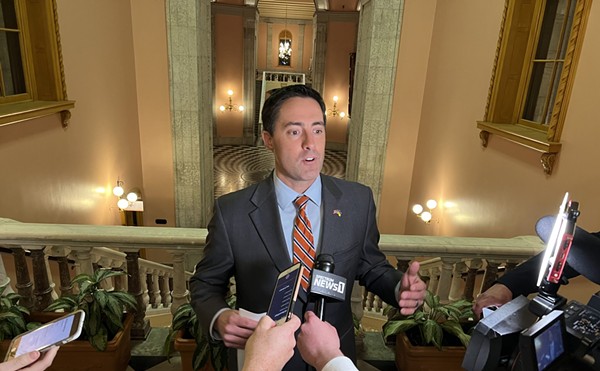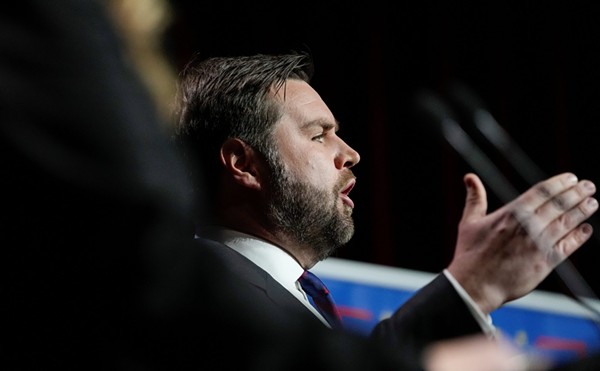"I did try cheating the system," she says. "I got away with it, too." For a while, anyway.
Damanti lives on Larchmont Road, a quiet, pleasant street of houses with tiny lawns and big porches. Only three blocks long, Larchmont ends at the Euclid city limits. Three Larchmont moms, tempted by Euclid's safer, better schools, have slipped their kids across the border and done jail time for it.
Damanti got fed up with Cleveland's Margaret Spellacy Middle School, which she says was full of "unruly kids" and teachers who couldn't control them. So she gave the Euclid schools a fake address that belonged to a "distant friend." She got her middle son, Joey, into Euclid's Central Middle School, within walking distance of her house.
"You could tell the difference immediately," Damanti says, "in the education, in the homework, in what they were showing him, in what he was telling me. The teachers were nicer, he was learning more, it was fun, it was cleaner, the kids were nicer." And Joey got all his textbooks right away. In Cleveland schools, he and his brothers often went without books until November or December. "He went to school with a good attitude, because everyone around him had a good attitude," his mother says.
But one day, when Joey was walking home from school, a teacher followed him and turned him in. Damanti was summoned to Euclid to face a police detective and an investigator for the school district. In May 1998, she pleaded no contest to a misdemeanor falsification charge and spent two days in the Euclid City Jail. "They did everything: the fingerprints, the picture, the looking in cracks and crevices -- very humiliating," she says.
The judge ordered her to pay more than $2,000 tuition for the time her son was in Central Middle School. Still, she says, "If I could get away with it again, without my name being known, I would do it in a heartbeat."
Across greater Cleveland, parents and suburban school districts are playing the same cat-and-mouse game. The parents are driven by a desire to give their kids the best future they can. School investigators, egged on by angry taxpayers, guard the suburbs' borders against "illegal students."
Most kids who get caught used to live in the town and are lingering in their old school too long, but some parents forge and falsify.
"We do get some families who are hard-core cheaters, who'll do whatever it takes," says Shaker Heights schools registrar Lisa Jones.
When parental instinct runs up against the law, parents usually lose. Altogether, the school districts adjacent to Cleveland investigate more than a thousand families a year, and they throw hundreds of illegal students out. Kids also jump from one suburban district to another. "Everybody is dealing with it," says Jones.
Teachers, bus drivers, and neighbors turn the kids in. School investigators visit homes, verify leases, tail parents, and stake out bus stops. They take parents to court, trying -- and often failing -- to make them pay for the time their children were in the wrong school. Sometimes, the chase goes as far as probate court. Every fall, as school starts, magistrates see a spike in guardianship applications, and they reject many as veiled attempts to get kids out of Cleveland schools.
"I know of many children who are [in suburban schools] who don't belong there," says Deborah Damanti. "But I will not ever turn them in. Because to me, that proves that the parent wants to give their children a better education."
Euclid catches more illegal students than any other Cleveland suburb, and it's cracked down the hardest on the kids' parents. At least six Cleveland mothers have served short sentences in the Euclid City Jail for giving the schools false addresses.
Investigators busted their first mom in 1996, when they put Cleveland school bus driver and Larchmont Road resident Judy Kincaid in jail. "Taught a Lesson," reads the headline of an old article about the case, still taped to a wall in the Euclid schools' office lobby, where parents can see it while registering their kids.
"I put my child in the Euclid school system because I wanted him to have a better life and a better education," Kincaid told reporters after she was sentenced. "I know I did wrong." Last month, she told Scene a different story -- that she was living with her sister-in-law in Euclid when she was arrested. She refused to answer any more questions.
"I used someone else's address for my kid to be entered into the Euclid school system," says Valerie Ciuprinskas, who was sentenced to 20 days in jail in December 1997. "I didn't know there was a law against that."
After her family moved out of Euclid, her son still wanted to go to Euclid High School rather than Cleveland's Collinwood High. Why not Collinwood? "Violence, and racial reasons, too," she says bluntly. "There's more black than there is white in the school system."
Susan Smith went to jail for 10 days in 1997 for using her sister's Euclid address to enroll her son. She heard so much negative news about the Cleveland schools in the late 1980s that she decided never to send her kids there. "There wasn't enough funds to learn, there wasn't enough books for the kids, or the teachers were going on strike," she says.
So when her son was old enough to go to school, she sent him to Euclid, even though she'd moved from Euclid to Cleveland to live with the boy's father. The two of them took turns driving her son to school, she says. Soon, her son could read her the stories she used to read to him.
But after two years, Smith saw an article about the Euclid schools busting Judy Kincaid. "When I read that, I thought, 'Oh, Lord, I'd better get back in the system.'" She took different routes home at night, afraid someone was following her.
In spring 1997, after a falling-out with her son's father, she moved back to Euclid to share an apartment with a new boyfriend. But it was too late. A month later, her ex-boyfriend's fiancée reported her to the school district.
"I was keeping my grandbabies [when] the police knocked on the door," she recalls. "They didn't handcuff me. They was nice enough about that." The police booked her, then released her on bond. A few months later, she appeared before now-retired Euclid Judge Robert Niccum, whose reputation for tough sentences had earned him the nickname "Stick 'Em" Niccum. He sentenced her to 10 days in jail. "This should teach you something. Send her in back," she recalls him saying.
"I was scared. I'd never been in trouble before," Smith says. She cried when she got to her cell. "It's no place I would want to be."
Later, the Euclid schools sued Smith for $7,000 in tuition, but a legal aid lawyer got the case dismissed, apparently because Niccum did not include a clear restitution order in Smith's file. (The former judge could not be reached for comment.)
Smith still lives in Euclid, and her son is in fifth grade there. "He's doing great," she says. She sounds torn about her run-in with the schools and the court. She says she doesn't encourage other parents to do what she did. But she also says, "I would do it again."
The man who busted Damanti, Kincaid, Ciuprinskas, and Smith is Patrick Newkirk, a retired Euclid police captain who's now the Euclid schools' residency and truancy officer.
He's a friendly guy with a soothing, slightly gravelly voice. Gray-haired with glasses, at ease in a suit and tie, he projects a charm mixed with a hint of a cop's authority and resolve. These days, he spends half his time tracking down truants, the other half looking for illegal students. He looks into about 400 tips a year and kicks out about 100 kids.
"We receive information from all kinds of sources: from residents of the community, from teachers, from bus drivers who drop a kid off by his house and there's a car waiting for a child," Newkirk says. "A teacher will call and say [that] the little third-grader said, 'My mom told me not to tell you, we don't live in Euclid.'"
Newkirk doesn't talk to kids themselves -- "It's not the kids' fault" -- but he does visit homes to see if parents really live where they say they do. He inspects leases and verifies them with landlords and the city's housing department.
To the Euclid City Schools, it makes financial sense to have Newkirk cracking down on illegal students. Local property taxes make up more than two-thirds of the Euclid school system's funding, so the more students sneak in or linger after they've moved, the less money there is to educate Euclid kids. Since the district spends more than $8,000 a year per child, Newkirk easily saves the schools much more than his $50,000-a-year salary (which the county pays).
Most of the parents Newkirk investigates do live where they say they do, he says. Many just have unusual family situations, like relatives in another city watching kids while parents work. But in a city with 10,000 apartments, condos, and rented homes, a lot of families come and go. About 6,000 children attend Euclid schools; 1,000 new ones enroll every year, and 1,000 leave.
"We usually track them through this," Newkirk says, holding up long lists of forwarding addresses the post office sends him: Cleveland, Cleveland, Willoughby, Cleveland, Cleveland, they read.
Parents have moved as far as Painesville and the West Side of Cleveland, but still kept their kids in Euclid schools. "[Parents say,] 'Well, the kid was in school and likes it so much, I don't want to uproot him.' I say, 'It's illegal. Once you move, you're obligated to move them.'"
In the last two years, Newkirk says, he's gone to court to collect tuition from more than a dozen parents. And if there's "flat-out fraud -- someone brings in a bogus lease, and the child's in the district for six months -- those cases we've gone to criminal prosecution on."
Mothers who've been caught say they were surprised that the schools tried so hard to catch them. They didn't know they'd be up against a retired cop who chases them down with a detective's techniques and tenacity.
When Newkirk wanted to prove that Jeneice Tait and her children really lived on Larchmont Road, and not with a friend in Euclid as she claimed, he had the Euclid city prosecutor subpoena Tait's lease from her landlord.
And when Tait appeared with her daughter's grandmother, who lived in Euclid, and presented 10-year-old papers that made the grandmother the daughter's guardian, Newkirk believed they were misusing the guardianship to keep the girl in Euclid schools. So he petitioned the probate court to revoke it. A magistrate did just that, ruling that the purpose for the guardianship, filed when Tait was 16, had expired.
Newkirk also forwarded Tait's case to the city prosecutor, who filed falsification charges against her. Tait pleaded guilty, and Judge Deborah LeBarron placed her on probation, fined her $250, required more than $2,000 restitution, and ordered her to perform 40 hours of community service or face 10 days in jail. Tait never completed the community service -- her son got sick, and she never rescheduled -- so LeBarron sent her to jail for 10 days in May.
"I can always understand where they're coming from," LeBarron, a mother of two, says of the mothers she's convicted of school fraud. "That doesn't necessarily make it right."
Tait did not want to talk to Scene. "[The judge] made her decision. The case is over with," she said. "I don't think it was fair, but it's not going to change anything."
Euclid city prosecutor Richard Weigand thinks school fraud deserves a jail sentence. "It's outright theft," he says. Because civil judgments against parents are hard to collect, "the only effective method for stopping this is to pursue criminal charges against someone."
When Judy Kincaid went to jail four years ago, Weigand says, "There was a big story made of it by the media -- how a woman was going to jail for just trying to get a better education for her kids." The criticism upset him. "We're always so generous with someone else's money," he says.
"I know every comment I got from taxpayers in the city was so favorable to us pursuing it. Someone came over to my house to thank me. People were saying thank you from my whole street. They said, when they saw it on TV, they jumped up and said, 'Yeah!'"
Some school districts face a lot of political pressure to crack down on illegal students. Angry voters often complain that their property tax money is educating kids who don't belong there.
"We feel there are several hundred illegal students in the district," says Bonnie Dolezal of Cleveland Heights, chairwoman of the Citizens Financial Oversight Committee, which campaigns against school levies. "I hear reports from people all the time, telling me that they see kids taking buses back and forth from the inner city up here. One man told me a couple years ago that they're riding the bus from downtown into Cleveland Heights with their instruments. They play in the band."
Dolezal's vision of hordes of illegal students invading her town's schools is based on anecdotes, not hard evidence. A spokeswoman for the Cleveland Heights-University Heights schools says Dolezal's figure of "several hundred" illegal students and her assertion that they're costing the district "millions and millions of dollars" are exaggerated.
"Our work just doesn't bear that out," says the district's Joanne O'Brien. "We may get a couple of hundred referrals [a year, but] when investigated, half of the referrals turn out to be students who are legally here." Last year, O'Brien says, the Heights schools investigated 215 students and pulled 94 out.
But the issue helped Dolezal's committee convince voters to shoot down millage requests in 1996 and 1999. (A levy narrowly passed in March, on the second try.) And it probably didn't help that one of the two students who set fire to a tower at Cleveland Heights High last year was attending illegally. Or that Yvonne Larry, one of the parents who sued the district in January over busing cutbacks, lived in Cleveland.
Attorney Ari Jaffe laughs when he's asked about his former client. Jaffe says someone recommended Larry as a good representative of parents the busing cuts affected, because she was an active member of the Garrity Elementary PTA and had denounced the cuts at a meeting. "I even went to her house to verify that she did live in the district," he says. He visited her and met her children at a house in Cleveland Heights.
But two days after he filed suit, he got a call from someone who said Larry really lived in Cleveland. "I called Mrs. Larry, and she told me that was true," Jaffe says. "I said I needed to remove her from the litigation. She apologized profusely and agreed it was the appropriate thing to do."
Larry's kids were quickly thrown out of the Heights schools, which have tried unsuccessfully to recover tuition from her.
"There's some question as to the involvement of her landlord in this," says O'Brien. "Someone was accepting mail, even though Mrs. Larry didn't actually live there." The White Pages that came out in the spring list Larry twice: in Cleveland and Cleveland Heights.
A recent visit to Larry's Cleveland address found her sitting on the porch with another woman as kids played in the front yard. She was not eager to talk.
"I don't want to traumatize my kids. They've been through enough," she says. "What I did, I did."
Larry said she had thought Cleveland Heights had better schools than Cleveland, but she's changed her mind now that her kids are enrolled in a Cleveland elementary school. They're getting "a much better education now," she says.
Larry claimed the Heights school district exaggerated her situation. "I know what I was doing was right. I didn't do anything illegally." She would not explain why she had two addresses.
Ike Smith, who investigates possible illegal students for the Shaker Heights schools, obviously enjoys his job, telling stories like a hard-boiled detective who's seen it all. "I'm the one who snoops," he says proudly. He won't let Scene take his picture. "I'm supposed to be stealth," he explains.
In his four years on the job, Smith has caught hundreds of illegal families. Once, he faced down a mom and an aunt who were impersonating each other. The mom lived in Cleveland, the aunt in Shaker Heights, each had a kid, and both kids went to Shaker Heights schools. "The mother would show up when they had conferences, and the aunt would show up on occasion," he says. Eventually, the school's staff caught on. Smith and Lisa Jones, the registrar, confronted the two women, they confessed, and the Cleveland mother's child was pulled out of school.
"Our school district is consistently ranked as one of the best in the nation," brags the Shaker Heights schools' website. Parents in other towns seem to agree. Last year, Shaker Heights investigated 319 students and threw out 68 for not living in the district. Almost all of that is Smith's handiwork. He says a little more than half of Shaker Heights' illegal students come from Cleveland, the rest from other suburbs. "We're talking every suburb on the East Side, with the exception of Solon and Orange, into and including Cleveland Heights."
Often he discovers that a suspect family just moved somewhere else in Shaker Heights, or that divorced parents are sharing custody. But he's also seen a lot of scams.
"The mother may pay the cheapest apartment complex maybe $400 a month in order to rent a place she doesn't occupy," he says. "[The landlords] want to keep the place rented. They don't want to turn down the money. It's also an opportunity for a place no one's going to damage." For the parents, "It's a lot cheaper than paying for private school per year. Our place, they equate to going to private school. It's the same quality education."
Families illegally sending their kids to Shaker schools often have better-looking houses than their neighbors, Smith says. "They've saved money sending kids to Shaker rather than private school, [so] the house just had a new roof on it, or it's the best-painted house on the street."
Others own property in Shaker Heights and also someplace else. "They claim they're living in the Shaker property," he says. "It's up to you to prove they don't. That becomes difficult sometimes, other than a physical inspection of the house to see if they're actually in the house and the kids actually come and go day after day."
The Shaker Heights schools are going to court next week to try to prove that Brenda and Phillip Cloud, owners of a Cleveland flower shop, illegally enrolled their children in Shaker. The district's suit for $50,000 was thrown out of court in December 1998, then reinstated by the appeals court this March.
Phillip Cloud says he lives next to the flower shop while his wife lives with their children in the Shaker Heights school district. The kids come to Cleveland during vacation and on the weekends.
"Shaker has everything you need," he says. "My wife and I felt that we wanted to give [our kids] the best start we could. So we made the sacrifice to pay high rents."
But when Smith and Jones visited the house Brenda Cloud claimed was her home in early 1997, they found adult clothes in one kid's closet and heard Cloud's six-year-old boy ask when they were going home. Smith also staked out the house three times before and after school, but didn't see the children, court records state.
Phillip Cloud says Smith just came by at the wrong times, because his kids usually came to the flower shop before and after school. "We picked them up in the morning before this fella started watching the house, and we dropped them off after he was through watching," he says. "All they had to do was ask us, what time do you leave home?"
The district also says Brenda Cloud admitted to living in the Cleveland school district for eight months after moving out of the rental house. "We have an explanation that would be legal," replies Phillip Cloud, but he won't reveal it until the trial.
Today, Brenda Cloud and her children live in an apartment in Shaker Heights.
"We force people into Shaker," says Ike Smith. "When the heat gets too much for them, they go and take the easiest way out, and get a place to stay inside the city limits."
Many local governments help suburban school districts hunt down illegal students. The Shaker Heights City Council recently voted to allow Shaker schools to look up addresses on local tax returns. Maple Heights' housing department conducts special inspections at the schools' request to verify parents' claims about where they live. And Maple Heights and Bedford city prosecutors have prosecuted parents for school fraud.
When Debbie Starcher and her family moved to Cleveland, her husband noticed a man in a car watching their house. He thought the man was a surveyor, but he was a Bedford police detective.
Starcher says she moved from a condo her dad owned in Bedford during her oldest son's first year of school. "I just kept him in that school to finish out the kindergarten year," she says.
The detective, who'd been following her, arrested her. Her son was thrown out of kindergarten. A judge ordered Starcher to reimburse Bedford schools more than $3,000 or face 90 days in jail.
"I didn't understand the severity of moving and leaving him in school," she says. "I feel I was treated unfairly. It was very ridiculous."
It took Starcher more than three years to pay off her debt. But the Bedford schools were lucky they collected at all. Some districts take parents to collection agencies instead of court, but either way, they rarely get the money. "If these were families with means, they would either be moving into the school district or paying private school tuition," says Shaker Heights spokeswoman Peggy Caldwell. Pat Newkirk says Euclid has won $30,000 in court judgments against parents in the last two years, but collected less than $2,000.
The fiercest battles against illegal students are fought on the East and Southeast sides, with their heavy rental neighborhoods and extremes of wealth and poverty. Although all suburban districts see illegal students, schools in West Side and outer suburbs report fewer investigations. A Parma school official says the district received about 40 referrals last year; about 20 students turned out to be illegal. North Olmsted investigated about a dozen students last year, and Fairview Park found only about a half-dozen illegal students in the last two years.
Even Lakewood, despite its many apartments and rented homes, reports getting only about 40 referrals a year. Ten investigated students withdrew last year, 18 the year before that. "We've had a really strict policy on this for a lot of years," says Superintendent Joseph Madak.
Schools farther from Cleveland occasionally see suburb-to-suburb migration. Bill Miller of Strongsville says he once got a tip that a student didn't really live in town, so he watched the student's parents pick him up after school, then tailed them to their home in Parma.
One district that doesn't have to turn away many illegal students is Cleveland. "Overall, this is not a big problem for this district," says spokesman Dan Minnich. The exceptions are specialized facilities like the Cleveland School of the Arts and a couple of schools with especially strong reputations: Forest Hill Parkway and James Ford Rhodes.
The state says Cleveland schools are in an "academic emergency," meeting none of the 27 standards Ohio uses to judge its schools. Of course, the standards are mostly based on the state's tough, often-attacked proficiency tests. Euclid met eight standards, placing it under academic emergency, too, while Cleveland Heights-University Heights met nine and is under "academic watch."
What do Cleveland officials say about parents who are willing to lie to get their kids out of the city's schools?
"We would encourage parents to take another look at the district," says Minnich. "We think things have changed significantly here over the last two years, since Barbara Byrd Bennett become CEO." Minnich says spending on school safety is up 60 percent this year, and "the CEO is working hard to improve the quality of the course offerings."
Back on Larchmont Road, Deborah Damanti is more cynical about the Cleveland schools her boys attend. "I don't see a thing different. I don't see anything changing."
Thousands of parents are using new school choice programs to get their kids out of Cleveland schools. Almost 4,000 Cleveland students attend private schools with state money, thanks to a controversial voucher program, and roughly 3,000 students from Cleveland and elsewhere attend state-funded, independent community schools in Cleveland and Parma.
State law allows students to go to public schools in other cities -- if the school district opens itself up to outsiders. But none of the 31 school districts in Cuyahoga County took in an out-of-district student last year.
"We're overcrowded," says Euclid superintendent Kurt Stanic.
"Our schools are pretty full," says Joanne O'Brien in Cleveland Heights.
Some parents are so desperate to get their kids out of Cleveland schools that they're willing to give up custody. Probate court magistrates see a spike in guardianship applications when school starts. Many applicants are suburban relatives of Cleveland kids, worried about the kids' safety in school or the quality of their education.
"We had people walk up about 20 minutes ago," says magistrate Alan Shankman the day after Labor Day. "The mother told me she was no longer able to afford Catholic school, her daughter was going into high school, and she did not want her daughter going to the city of Cleveland schools. And the grandmother, who lived in Garfield [Heights], was willing to take her in.
"I thanked them for being honest, but [said] that, based on the state of the law, the guardianship wouldn't be appropriate. So they didn't even apply."
In Ohio, getting a child into a different school is not reason enough to make someone a guardian. But the applications keep coming.
"Every year we expect the trend to decline. We hope people wouldn't disfavor any school district," says Shankman. "But instead of it declining, it's increased every year. And people are becoming more sophisticated in giving the court reasons other than blatant school reasons."
When a custody change would mean a change in schools, the magistrates usually send an investigator to see the family's home life -- especially, says magistrate Heidi Koenig, if the child's parent lives in Cleveland.
School officials sit in on a lot of guardianship hearings in early fall. Pat Newkirk attended three probate court hearings in September and five in the first week of October alone.
He has reason to keep up on even legitimate applications: A guardian's district can collect tuition from the parent's district -- if it knows about the change. But when Newkirk sees a Euclid resident filing for guardianship of a kid he's already kicked out, he usually objects.
Newkirk and the magistrates say it's their duty to make sure no one's using a guardianship to get around the law. But when families lead transient lives, it's not always clear how the law should apply to them.
Last month, Deidre Hudson, her 16-year-old daughter Perdesha, and Perdesha's grandmother, Mable Walker, all came to Koenig's office. They asked her to make Walker, who lives in Euclid, Perdesha's guardian.
Newkirk objected. At the end of last year, he removed Perdesha from the Euclid schools because her mother had a Cleveland address. "She was with her mom in Cleveland this summer," he says later. "Now school starts, and they want her with the would-be guardian."
Koenig turned down the request, writing that it appeared the main reason was to get Perdesha back into the Euclid schools.
On a Sunday afternoon last month, when a reporter dropped by Mable Walker's tiny Euclid apartment, six family members were there, including Deidre Hudson. A couch takes up most of the living room, and a statue of Jesus and collectible dolls look down from a cabinet. As Deidre Hudson's brother watches a kung fu movie, her happy baby wanders under the dinner table, curiously poking the visitor, while her older daughters come and go.
Hudson says she's been splitting her time between her mother's apartment and her boyfriend's house in Cleveland since last summer, when she went on unpaid maternity leave, had a baby, and could no longer afford a place in Euclid. Hudson says she can't live with her mother full-time. "I don't want to get my mother evicted because there's too many people here."
But Hudson doesn't get along with her boyfriend anymore and doesn't want her daughter exposed to their arguments, the company her boyfriend keeps, or the tough neighborhood he lives in. The family says Perdesha lives with Mable Walker, though she did spend time with her mother in Cleveland this summer.
For now, Perdesha isn't in school. "I'm not going to be putting her in school [in Cleveland] if I'm going to be jumping back and forth," Hudson says.
Perdesha wants to go to college to be a physical therapist. "As far as us going to court and them saying that I should go to a Cleveland school, I don't see how, because I stay here," she says. "I don't understand why they won't let me go to school . . . It's really just wasting my time."
Why, Hudson asks, are the Euclid schools trying so hard to keep kids out?
She's told the story of Deborah Damanti and other falsifying parents. Hudson's brother looks up from the TV.
"She went to jail?" he asks. "For her kids to go to Euclid schools? That was the reason? Is Euclid school worth going to jail?"
Perdesha's older sister, Chanika, now a University of Toledo student, says she went to Parma, Collinwood, and Bedford high schools. "You have to apply yourself anywhere you go," she says. "It really doesn't make a difference if you're in a suburban school or if you're in a Cleveland public school. It's all about what you make out of it."
At first, the family planned to object to Koenig's ruling and take their case to a probate court judge. But by early October, Hudson found an apartment in Euclid. She says Newkirk won't let Perdesha back in school until she moves in on the 14th. "This is very frustrating," she says. "All of this is because I don't have a place to stay."
"I can't believe how much time and effort is put into this issue," says one suburban official who works on residency. "What is this all about, that we're trying to keep kids from the wrong school?" Parents sending their kids to the suburbs "want the best for their children. That should be something we applaud."
The official would like to see suburban districts adopt open-enrollment policies but believes race is one reason out-of-district students aren't welcome. Angry callers often say, "'It's our property taxes,'" the official says. "But everyone knows it's been ruled that it's unconstitutional to be paying for schools this way."
Recently the official got a tip that a mother was being evicted after not paying rent for a year. But the family wasn't going to another apartment in Cleveland. They were homeless. And, under federal law, homeless families can't be thrown out of school. So the official secured federal grant money to transport the kids from the shelter to school.
"They're all our children," the official says of illegal students.
But as long as schools rely so much on local tax money, a lot of suburbanites will think of them as someone else's problem.
"This policy is based strictly on school finance," says Madak, Lakewood's superintendent. "The school's role is not to sit in judgment and let this kid into school because he has a tough family situation. Schools have no latitude. [We can't say we] won't let this kid come because his family situation is not as bad as the other."
Sitting in probate court, waiting for a guardianship hearing, Pat Newkirk is asked if he thinks his pursuit of illegal students is what's best for the kids.
"If a kid's in the district illegally, I don't think I can put it in terms of what's best for the kid. The law in Ohio says the kid goes to school where the parents reside . . . I know it's going to make me look bad, but I'm not in a position to say." Newkirk says some students have taken two or three buses through Cleveland to get to Euclid every day. "I don't think that's in the best interest of the child."
Paula Morelli, residency investigator in Maple Heights, admits there are "a lot of times" she doesn't think pulling students out of school is best for them.
"But I can't make exceptions," she says. "If I start to feel really bad for those kids and let them stay, and I've treated them differently, that's discrimination." She says, when she feels bad for parents, she often tries to help them enroll in the district where they really live. And kids who move out of Maple Heights after April 15 can finish the school year -- if their parents pay tuition.
There are times when, Morelli's not benevolent. "Sometimes they're deliberately making me chase them. Then I'm to the point where I'm like 'Just leave.'"
She thinks the parents' dishonesty is bad for their kids. "It's almost abuse, making the children lie. That's the part that really upsets me: a 7-year-old walking around with a weight on his shoulder, thinking, 'If someone finds out I don't live here, I'll have to leave.' They can't make friends, can't have anyone over to their house, because what if that person tells?"
Once, Morelli says, she found out that a single mom with three young kids was living in Bedford but sending her oldest child to a Maple Heights school. "She had no phone, I didn't know how to get ahold of her, but I knew she had to be picking up her child from school. So I waited with the child until the mom came.
"She came, with a single stroller with two babies in it, to pick up her kindergartner. I told her I know she's living at an address in Bedford. She cried and said, 'I don't know what to do. I can't get on the lease.'"
The woman was walking from Bedford to Maple Heights and back to sneak her child into the Maple Heights school, because the Bedford schools had refused to enroll her without a lease. But the people she was staying with risked eviction if the landlord found out about her and her kids.
"I asked her, 'How are you getting [back] to Bedford?' She said, 'I'm going to walk. I don't have any money for the bus.'
"I couldn't leave. I took her where she needed to go, got her laundry, and took her to the Laundromat. Then I called my counterpart in Bedford and got her kids enrolled in school there.
"I think the only thing that sets me apart from those people is a good job and a husband," says Morelli. "Anybody could be in that position. I try to remember that."











